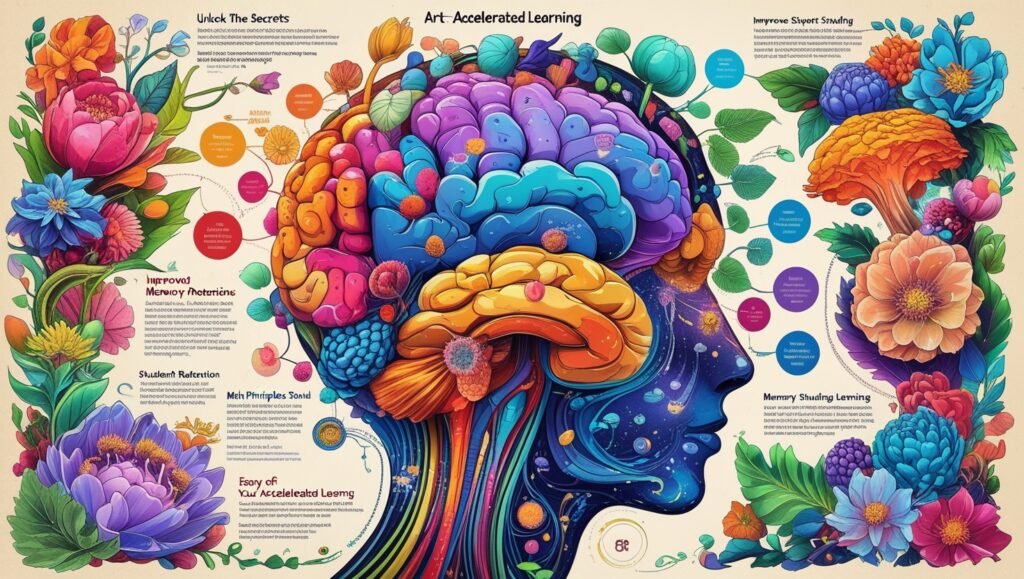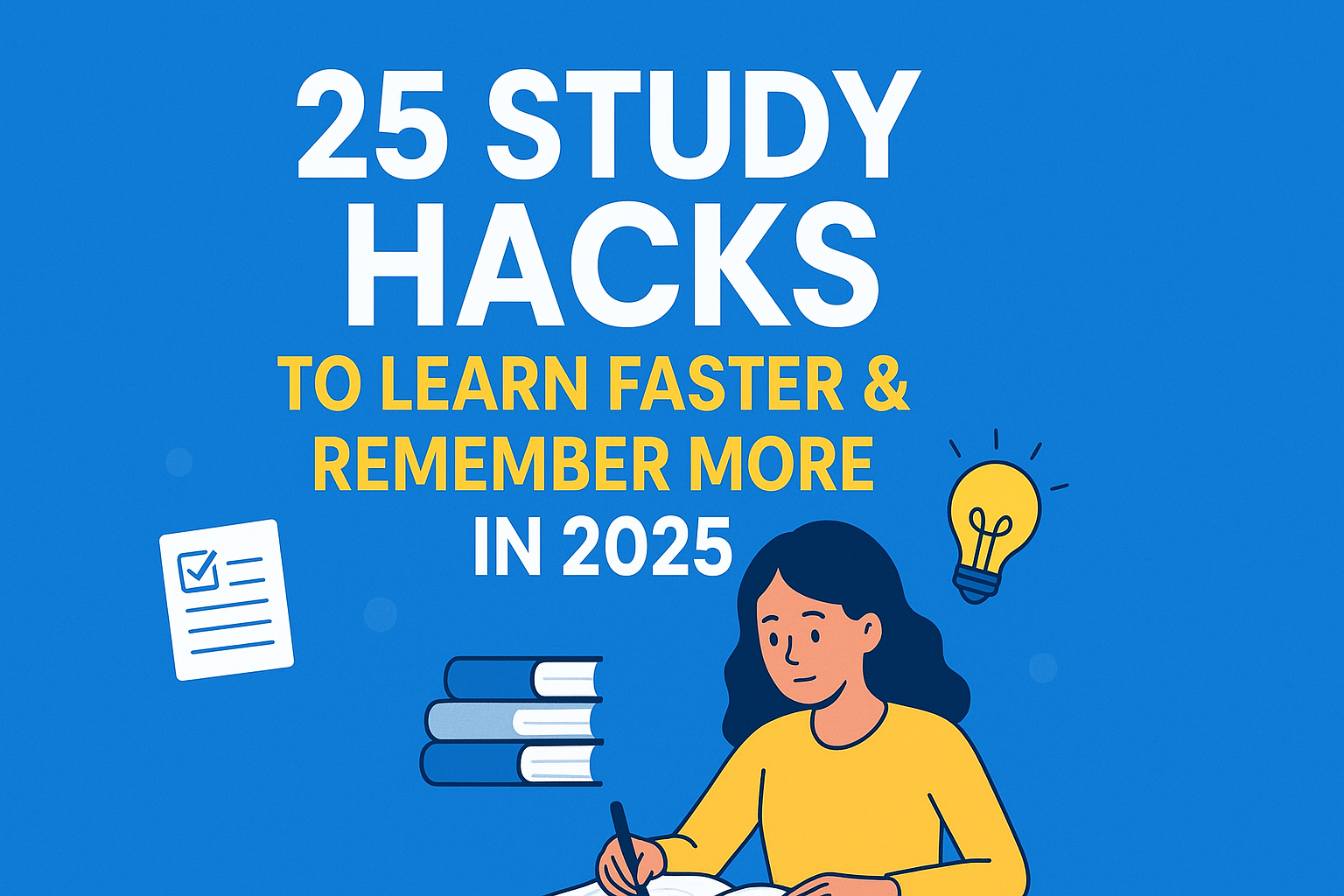study hacks

There’s a very specific feeling that shows up after a long study day: the desk is a mess, the highlighter is dry, and somehow the brain isn’t any fuller than it was in the morning. It’s not laziness. Often, it’s the technique. The right study hacks change the shape of a session: ramp-up is shorter, focus is steadier, and recall is there when it matters. If this year is supposed to be different—better grades, one big exam, a serious career pivot—then the habits underneath need to be different too. This guide is built for students, busy professionals, and persistent self-learners. It’s practical and action-heavy: real settings, measurable outcomes, and little rituals that help on boring Tuesdays at 7 p.m. The invitation is simple: pick three, use them tonight, and make it real.
Study Planning & Time Management
Hack 1: Pomodoro, labeled not just timed
Set 25 minutes on, 5 off. Repeat four times, then step away for 15–20 minutes. Here’s the twist that makes it work: label the block before starting. “Chain rule drills (15)—circle errors” is a different promise than “math.” A timer without a label is just noise. Some sessions call for 50/10 deep work instead; there’s no prize for sticking to 25/5 if the brain is finally chewing through a hard derivation.
Hack 2: The five-minute Sunday sweep (80/20)
Open the syllabus, exam pattern, or problem sets. Circle the top 20% of topics that keep showing up in tests and assignments. That list drives the week. It feels a bit ruthless because it is. Time is finite, and not all chapters are equal. Make peace with the idea that “doing everything” is worse than doing the right few things very well.
Hack 3: Make goals finishable today
“Study biology” is not a goal; it’s a mood. Try this instead: “Review photosynthesis → draw one pathway diagram → quiz 12 cards → rewrite three unclear notes.” A goal that fits on one sticky note gets done. If it takes two sticky notes, it’s a plan, not a goal.
Hack 4: Stop rereading; force recall
Rereading feels safe, like looping a favorite song. It doesn’t build memory. Close the book and try one of these: the blank-page dump (everything remembered, then fill the holes), blurting (skim a page, shut it, list the points, compare honestly), or a short burst of practice questions. The discomfort means it’s working.
Improve Focus & Concentration
Hack 5: Engineer the desk
Tiny environmental details stack up. One book or app open at a time. Water within arm’s reach. A warm desk lamp angled down so the room feels calmer. Chair adjusted so the knees aren’t fighting the desk edge. Put the phone away or lock it; “discipline” is cheap when temptation is out of reach.
Hack 6: Sound you can forget
Use brown noise for reading, gentle lo-fi for routine review, and silence for proofs or heavy problem-solving. Keep the sound consistent within a session; novelty pulls attention sideways. If lyrics creep in, switch to rainfall. If the brain feels jittery, try a slow ambient track with no percussion.
Hack 7: Two-minute ignition
Set a timer for two minutes. Write the first heading, solve one warm-up, open the problem set and circle three targets. After motion starts, stopping feels ridiculous. This hack is not about productivity gimmicks; it strips the friction from minute zero.
Hack 8: Three slow breaths that actually change the session
Inhale four counts, hold four, exhale eight—three cycles. It’s not “mindfulness” for its own sake; it’s clearing the static so the first 25-minute block has a shot at being honest work instead of twitchy fidgeting.
Memory-Boosting Techniques
Hack 9: Feynman, fast and without jargon
Set a five-minute timer and explain the topic like talking to a younger cousin. If the explanation leans on jargon, there’s a hole in understanding. Mark the wobble point and study that exact gap tonight. The method works because clarity is unforgiving.
Hack 10: Teach-back voice notes
Record a 90–120 second explanation on the phone. Tomorrow, listen at 1.25x while walking to class or making tea. The spots where speech slows or turns vague? That’s where the next study block should go. Do a cleaner take after reviewing. Each version sticks a bit more.
Hack 11: Spaced repetition that doesn’t drown you
Yes to Anki or Quizlet; no to decks that feel like an avalanche. Keep cards short—one idea per card—and group by topic and difficulty. Typical intervals like 1 day, 3, 7, 14 are plenty. If a card keeps coming back angry (a “leech”), rewrite it into two simpler cards or add a mnemonic.
Hack 12: Draw the idea, even if messy
Use mind maps for relationship-heavy topics (ecology, world history), flowcharts for processes (cellular respiration, algorithms), and simple diagrams for systems (circulatory pathways, network topologies). Keep labels short and verbs active. The drawing is part of the thinking.
Leverage Technology & AI
Hack 13: AI as a sparring partner, not a shortcut
Dump messy notes and ask for a structured summary—then rewrite in personal language. Generate 10 practice questions; attempt them first, only then ask for answers. Request analogies to simplify a concept, but verify with the textbook. Supervision is the difference between useful and misleading.
Hack 14: If willpower is tired, outsource it
Forest for gentle focus. Cold Turkey or Freedom for hard blocks. A simple rule: “No social apps 7–10 p.m. on weekdays.” Add friction to the wrong choice. If Chrome whispers to open a new tab, let the blocker answer “no” so the brain doesn’t have to.
Hack 15: Summarize → verify → expand
Use a summarizer to compress the chapter into key ideas. Cross-check against the source. Then add equations, worked examples, and personal notes. The summary buys time; the expansion builds memory.
Lifestyle Hacks
Hack 16: Study, then sleep on it
A 10–15 minute review 30–60 minutes before bed signals the brain that the material matters. Dim the lights, avoid screens, and shut the day down gently. Memory consolidation is real; get out of its way.
Hack 17: Food that helps, not hurts
Keep quick options around: yogurt, nuts, bananas, boiled eggs, whole-grain crackers, a square of dark chocolate. Heavy, oily meals right before a session are a self-made fog machine. Also: bring a water bottle to the desk. Yes, it matters.
Hack 18: Hydration, on purpose
A sip at every break. For two-hour marathons, a small electrolyte pinch helps. The first sign of mild dehydration isn’t thirst—it’s that everything becomes slightly harder than it should be.
Hack 19: Two-minute movement between blocks
Ten squats, a hamstring stretch, rolling the shoulders, a brisk walk to the end of the hall. Eyes look far away, not at the screen. Blood moves; attention follows.
Advanced Learning Strategies
Hack 20: Interleaving beats grinding
Alternate related topics in a single study block. Example: calculus differentiation problems → physics application → a small set of statistics questions. It feels less smooth than massed practice—and that desirable difficulty pays off on test day.
Hack 21: Make it real, quickly
Turn abstractions into scenes: a greedy algorithm is choosing the best bite with a tiny budget; chemical equilibrium is a crowd finding balance at a narrow doorway; a database index is a book’s table of contents for a giant library. A good analogy is worth a page of definitions.
Hack 22: Notes that pull their weight
Cornell for lectures (cue column, summary at bottom). Outline for staircase topics (where each idea sits on another). Blurting for the final two weeks—force recall, then patch holes. Split-page for problem-heavy subjects: steps on the left, “why this step?” and “what to check next time” on the right.
Hack 23: Weekly mock + honest post‑mortem
One timed test, end to end. Then the important part: tag each error. Knowledge gap? Misread question? Rushing? Next week’s plan gets one fix per tag. The scoreboard is on paper, not in vibes.
Bonus
Hack 24: Accountability with a tiny agenda
Meet or call weekly for 45 minutes: 10 minutes progress updates, 25 minutes silent co-study, 10 minutes commitments for next week. Rotate timekeeper and scribe so it stays light and fair. It feels small and keeps the whole month from drifting.
Hack 25: Rewards that actually feel like rewards
After three honest blocks, take the treat. A walk. A snack. Ten minutes of a favorite video. Small, variable rewards make habits sticky without turning the study plan into a punishment schedule.
Practical Mini-Systems You Can Use Tonight
- The Label and Log
Before each block, write a label with an outcome: “Mechanics—10 MCQs (time: 17m).” After the block, jot one line: “Missed 3 due to sign errors—review tomorrow.” It takes 10 seconds, creates closure, and guides the next session without drama. - The Error Ledger
For every test or problem set, keep an “error ledger.” Three columns: mistake, cause, fix. If “misread” shows up often, slow down the first sentence of each question. If “rushed math” appears, write units and signs before touching numbers. The ledger turns frustration into a checklist. - The Two-Device Rule
If possible, separate devices: one for study (laptop), one for communications (phone). The phone lives outside the room. If only one device is available, use a browser profile with no logins and a blank new-tab page. The goal isn’t perfection—it’s fewer rabbit holes. - The Sunday Stack
On Sunday, pick three big rocks for the week (the highest-impact topics), five medium tasks, and a handful of small ones. Schedule the big rocks first, mornings if possible, and let the small tasks fill the cracks. The stack handles 80% of “what do I do next?” anxiety. - The Night-before Prompt
Write a one-line plan for tomorrow’s first block before sleep. “Chapter 4, examples 1–3, focus on error types.” The brain does quiet prep work overnight. In the morning, there’s less fumbling.
FAQs
What are the best study hacks for exams?

The highest-return combo is simple and a little boring: Active Recall, Spaced Repetition, weekly timed mocks, and a real error log. Add a distraction-free setup and Pomodoro to protect execution, and most people don’t need fancier systems.
How can I improve memory for studying?

Use spaced intervals instead of cramming. Teach the idea out loud in short voice notes and listen again tomorrow. For complex webs of information, draw a mind map and name the links (“leads to,” “balances,” “depends on”) so the connections are explicit.
Which AI tools actually help students?

A chat assistant can condense messy notes, generate practice questions, and suggest analogies; a spaced-repetition app handles reviews; a blocker protects attention. The rule that keeps it safe: verify anything important against class material.
How many hours should I study daily?

On weekdays, three to four honest Pomodoro cycles maintain momentum. During heavy prep, weekends can stretch to six to eight cycles with longer breaks. If quality drops, shorten the sessions and tighten the labels.
Conclusion
There isn’t a “secret”—there’s a stack. A session has a shape: label → focus → move → record → step away. Memory has a cycle: struggle to retrieve, then review, then sleep on it. Progress has a simple scoreboard: what got finished, which errors got fixed, what felt easier this week than last. Pick three of these study hacks, use them tonight, and write a one-line log after each block. That tiny moment of honesty is what builds the next week’s plan—and the results people notice later. If this was helpful and the goal is steady improvement, subscribe to Sumanth The Explorer for weekly, practical tips that respect hard days and still work.
How to Study Faster and Remember More in 2025: A Practical, No‑Nonsense Guide, Powerful Methods
Subscribe for more information



I enjoy what you guys tend to be up too. This kind of clever work and exposure!
Keep up the wonderful works guys I’ve you guys to my own blogroll.